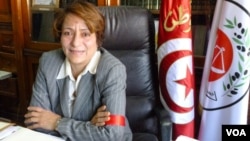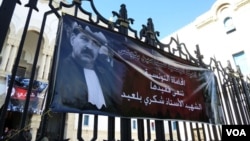TUNIS —
Tunisian judges complain that two years after the ousting of President Zine El Abdine Ben Ali, the government is still interfering in the justice system. Following arrests made Thursday in the murder investigation of opposition leader Chokri Belaid, the case presents one of the biggest tests for the judiciary.
Rows of razor wire and army vehicles surround the courthouse in Tunis. At the entrance, lawyers in their customary black and white robes are trailed by their defendants and dozens of interested onlookers.
Above, banners bearing the face of assassinated opposition leader Chokri Belaid hang from the colonnades.
Demands for justice over the killing are matched by accusations from the opposition that an independent investigation is impossible.
Raoudha Karafi, vice president of the Association of Tunisian Magistrates and advisor to the Supreme Court, urges justices to take responsibility despite the absence of institutional safeguards for the independence of the judges. She adds that the future of Tunisian justice really depends on their work.
Karafi wears a red ribbon on her arm - a symbol of protest by magistrates who say the government is still interfering in the justice system.
She says reform has not taken place in Tunisia. The Superior Council of the Judiciary, she says, is a council inherited from the old regime that has no legitimacy. The Minister of Justice, she says, sometimes uses the system to reprimand judges as in the recent instance of 81 judges suspended without any recourse or chance to defend themselves.
Many Tunisians complain that the justice system is still not fair or fully independent.
Over several shots of strong coffee at a popular café opposite the court, lawyers discussed Belaid's killing.
One lawyer says that now, as after every revolution, there is a crisis. He considers it as a step that all people who go through a revolution must cross.
A female colleague says revolution is dangerous and with the murder of Belaid and weapons circulating freely, there are reasons to be afraid.
Many opposition supporters blame the killing on the ruling Ennahda party.
Government spokesman and Ennahda member Samir Dilou insists there will be an independent investigation.
Dilou says there must be answers on three levels. First, she says, the criminal responsibility will be determined with evidence. Second, she says there must be an analysis of the circumstances of the case. And third, she says a political responsibility should be based on the findings in the case.
The government says it takes time to reform the institutions that were corrupted under former President Ben Ali. The investigation into Belaid's assassination will test how far those reforms have come.
Rows of razor wire and army vehicles surround the courthouse in Tunis. At the entrance, lawyers in their customary black and white robes are trailed by their defendants and dozens of interested onlookers.
Above, banners bearing the face of assassinated opposition leader Chokri Belaid hang from the colonnades.
Demands for justice over the killing are matched by accusations from the opposition that an independent investigation is impossible.
Raoudha Karafi, vice president of the Association of Tunisian Magistrates and advisor to the Supreme Court, urges justices to take responsibility despite the absence of institutional safeguards for the independence of the judges. She adds that the future of Tunisian justice really depends on their work.
Karafi wears a red ribbon on her arm - a symbol of protest by magistrates who say the government is still interfering in the justice system.
She says reform has not taken place in Tunisia. The Superior Council of the Judiciary, she says, is a council inherited from the old regime that has no legitimacy. The Minister of Justice, she says, sometimes uses the system to reprimand judges as in the recent instance of 81 judges suspended without any recourse or chance to defend themselves.
Many Tunisians complain that the justice system is still not fair or fully independent.
Over several shots of strong coffee at a popular café opposite the court, lawyers discussed Belaid's killing.
One lawyer says that now, as after every revolution, there is a crisis. He considers it as a step that all people who go through a revolution must cross.
A female colleague says revolution is dangerous and with the murder of Belaid and weapons circulating freely, there are reasons to be afraid.
Many opposition supporters blame the killing on the ruling Ennahda party.
Government spokesman and Ennahda member Samir Dilou insists there will be an independent investigation.
Dilou says there must be answers on three levels. First, she says, the criminal responsibility will be determined with evidence. Second, she says there must be an analysis of the circumstances of the case. And third, she says a political responsibility should be based on the findings in the case.
The government says it takes time to reform the institutions that were corrupted under former President Ben Ali. The investigation into Belaid's assassination will test how far those reforms have come.





